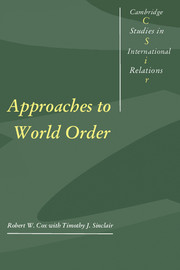Book contents
- Frontmatter
- Contents
- Preface
- Acknowledgements
- Part I Overviews
- Part II Theory
- 3 The idea of international labor regulation (1953)
- 4 Realism, positivism, and historicism (1985)
- 5 On thinking about future world order (1976)
- 6 Social forces, states, and world orders: beyond international relations theory (1981)
- 7 Gramsci, hegemony, and international relations: an essay in method (1983)
- 8 Towards a posthegemonic conceptualization of world order: reflections on the relevancy of Ibn Khaldun (1992)
- 9 “Take six eggs”: theory, finance, and the real economy in the work of Susan Strange (1992)
- Part III Interpretations
- Part IV Multilateralism
- Complete bibliography of works by Robert W. Cox to 1995
- Index of names
- Index of subjects
- CAMBRIDGE STUDIES IN INTERNATIONAL RELATIONS
6 - Social forces, states, and world orders: beyond international relations theory (1981)
Published online by Cambridge University Press: 05 June 2012
- Frontmatter
- Contents
- Preface
- Acknowledgements
- Part I Overviews
- Part II Theory
- 3 The idea of international labor regulation (1953)
- 4 Realism, positivism, and historicism (1985)
- 5 On thinking about future world order (1976)
- 6 Social forces, states, and world orders: beyond international relations theory (1981)
- 7 Gramsci, hegemony, and international relations: an essay in method (1983)
- 8 Towards a posthegemonic conceptualization of world order: reflections on the relevancy of Ibn Khaldun (1992)
- 9 “Take six eggs”: theory, finance, and the real economy in the work of Susan Strange (1992)
- Part III Interpretations
- Part IV Multilateralism
- Complete bibliography of works by Robert W. Cox to 1995
- Index of names
- Index of subjects
- CAMBRIDGE STUDIES IN INTERNATIONAL RELATIONS
Summary
Academic conventions divide the seamless web of the real social world into separate spheres, each with its own theorizing; this is a necessary and practical way of gaining understanding. Contemplation of undivided totality may lead to profound abstractions or mystical revelations, but practical knowledge (that which can be put to work through action) is always partial or fragmentary in origin. Whether the parts remain as limited, separated objects of knowledge, or become the basis for constructing a structured and dynamic view of larger wholes, is a major question of method and purpose. Either way, the starting point is some initial subdivision of reality, usually dictated by convention.
It is wise to bear in mind that such a conventional cutting up of reality is at best just a convenience of the mind. These segments, however, derive indirectly from reality insofar as they are the result of practices, that is to say, the responses of consciousness to the pressures of reality. Subdivisions of social knowledge thus may roughly correspond to the ways in which human affairs are organized in particular times and places. They may, accordingly, appear to be increasingly arbitrary when practices change.
International relations is a case in point. It is an area of study concerned with the interrelationships among states in an epoch in which states, and most commonly nation-states, are the principal aggregations of political power.
- Type
- Chapter
- Information
- Approaches to World Order , pp. 85 - 123Publisher: Cambridge University PressPrint publication year: 1996
- 45
- Cited by

